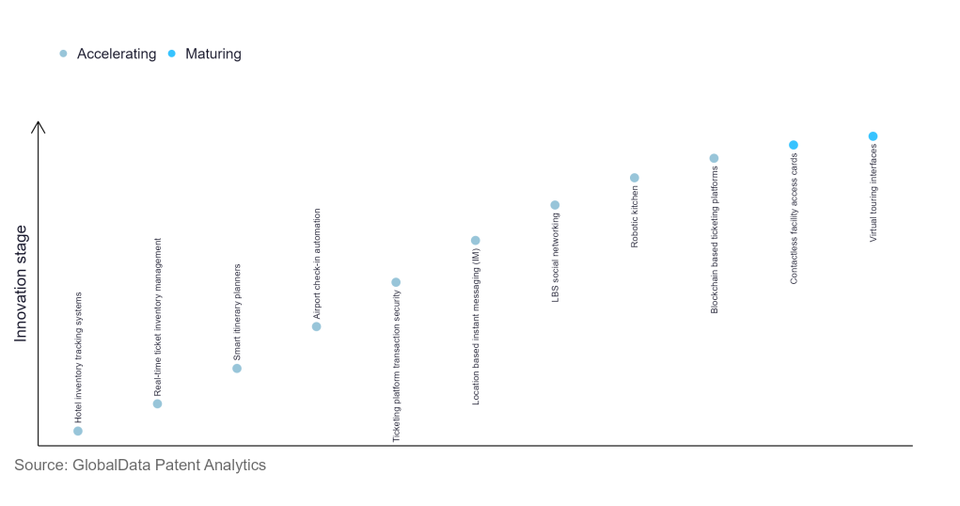Ticketing
Powered by
Leading innovators in reservation system automation
The travel & tourism industry continues to be a hotbed of innovation, with activity driven by a greater desire from consumers for personalised offerings that heighten the traveller experience. Delivering this requires the collection and effective use of large amounts of personal data and this has significant cybersecurity implications.
Technologies such as artificial intelligence, cybersecurity, the internet of things, and cloud solutions are all growing in importance. In the last three years alone, there have been over 15,000 patents filed and granted in the travel & tourism industry, according to GlobalData’s report on Innovation in Travel: Reservation system automation.
However, not all innovations are equal and nor do they follow a constant upward trend. Instead, their evolution takes the form of an S-shaped curve that reflects their typical lifecycle from early emergence to accelerating adoption, before finally stabilising and reaching maturity.
Identifying where a particular innovation is on this journey, especially those that are in the emerging and accelerating stages, is essential for understanding their current level of adoption and the likely future trajectory and impact they will have.
20+ innovations will shape the travel & tourism industry
According to GlobalData’s Technology Foresights, which plots the S-curve for the travel & tourism industry using innovation intensity models built on over 21,000 patents, there are 20+ innovation areas that will shape the future of the industry.
Within the emerging innovation stage, travel plan optimised charging and robo taxis are disruptive technologies that are in the early stages of application and should be tracked closely.
Real-time ticket inventory management, LBS social networking, and smart itinerary planners are some of the accelerating innovation areas, where adoption has been steadily increasing.
Among maturing innovation areas are virtual touring interfaces, which are now well established in the industry.

Reservation system automation is a key innovation area
Automated reservation systems are capable of processing bookings from a range of platforms and syncing them in one system. This is especially important in the era of online travel agents as bookings can come from multiple sources.
An automated system speeds up the booking process by automatically generating confirmation numbers and sending them to guests or passengers. By removing the manual element of traditional booking management, these systems reduce the scope for human error. The data collected and processed can also help with personalised offerings and more effective marketing messaging.
GlobalData’s analysis also uncovers the companies at the forefront of each innovation area and assesses the potential reach and impact of their patenting activity across different applications and geographies.
According to GlobalData, there are 100+ companies, spanning technology vendors, established travel & tourism companies, and up-and-coming start-ups engaged in the development and application of reservation system automation.
‘Application diversity’ measures the number of different applications identified for each relevant patent and broadly splits companies into either ‘niche’ or ‘diversified’ innovators.
‘Geographic reach’ refers to the number of different countries each relevant patent is registered in and reflects the breadth of geographic application intended, ranging from ‘global’ to ‘local’.
Innovation in reservation management automation is characterised by the involvement of a diverse set of companies. Ridesharing companies such as Didi, Uber, and Lyft are actively filing for patents in this area, registering 188, 63 and 37 patents since 2015, respectively.
Tech companies such as Alphabet, Amadeus and IBM are also active, but while travel & tourism service providers are not among the most active filers, they are most certainly present. Among such companies, Expedia and Airbnb rank highest having applied for 13 and five patents each since 2015.
These numbers are noticeably lower than those of tech players, suggesting a possible preference for buying or licensing solutions developed and provided by third-party specialists.
To further understand the key themes and technologies disrupting the travel & tourism industry, access GlobalData’s latest thematic research report on Key Themes in Travel and Tourism for 2023.